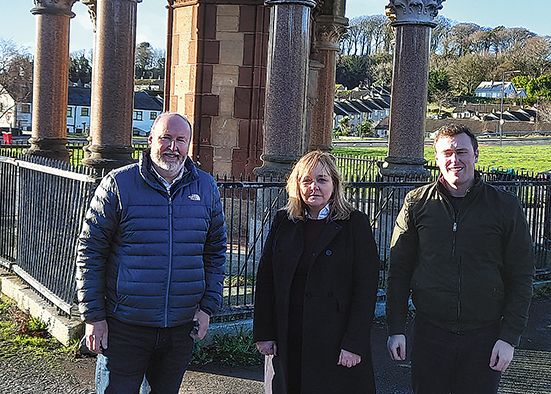EU funding could restart Shrigley clock restoration
EU funding could restart Shrigley clock restoration
6 September 2023

EUROPEAN funding could finally pave the way for the restoration of Shrigley’s iconic Victorian clock.
The Housing Executive owns the Martin Memorial Clock which had its bell and interior mechanism removed over three decades ago and placed in storage.
Last year, an appeal to the UK government’s so-called Levelling Up Fund to secure the money required to put the tick back into the historic clock proved unsuccessful.
Villagers and local politicians are keen to see the clock restored to its former glory as part of a regeneration initiative in the village.
Many are concerned to see the historic landmark falling into disrepair, but hopeful that it can be restored to be enjoyed for generations to come to reinforce its connection with the village’s industrial past.
Last week, the restoration of the protected structure was raised with the Housing Executive’s chief executive Grania Long when she met local politicians to outline the organisation’s Housing Improvement Plan.
Rowallane councillor and local historian Callum Bowsie is keen to see the clock restored and raised the issue with Ms Long who agreed to investigate if EU PeacePlus funding could be secured to finance a restoration initiative.
Welcoming the move, Cllr Bowsie commended the Housing Executive for working with Strangford MLAs Michelle McIlveen and Harry Harvey to submit the Levelling Up Fund bid last year.
“As the bid was unsuccessful, I explained to Ms Long that it’s important we don’t give up on this cherished monument and that other funding pots available exclusively to heritage should be sought,” he said.
“I am encouraged to hear Ms Long confirm the Housing Executive is going to explore PeacePlus funding to restore Shrigley’s Martin Memorial Clock.”
Earlier this year, Ms McIlveen said the clock is one of the last remaining pieces of Victorian architecture in the village.
She said while full restoration could be very expensive, there is a need to focus on what can be done in the interim to prevent further deterioration of the clock.
“It is unacceptable that an old clock of this significance and splendour should be allowed to fall into such a sad state of repair,” she declared.
Ms McIlveen said that previously, funding was provided for a conservation management plan by the Department for Communities Historic Environment Division which was developed on behalf of the Follies Trust.
She said the report found that it would cost almost £300,000 to fully restore the Shrigley clock tower, a cost which the Housing Executive was unwilling to meet.
Ms McIlveen and Mr Harvey both wrote to the housing body to not only highlight its public responsibility to maintain this listed property in its possession, but stressed the importance of the monument to the people of Shrigley.
Ms McIlveen added: “Monuments such as these are an important snapshot of our history and part of the fabric of our built heritage which should be cherished and protected.”
The Strangford MLAs say while they appreciate that full renovation works might be extremely expensive, it is very important that further deterioration of the monument does not occur.”
The Housing Executive owns the clock as it sits on land transferred to it in the early 1970s by the local council.
Ms Long has previously said that the clock’s condition has been raised with the organisation and other agencies on a number of occasions and she appreciates the interest in the Executive’s plans for it.
But she said at a time of significant funding shortfall for investment in tenants’ homes, it would not be appropriate to use income derived from rents to fund the considerable costs that would be required to undertake a full restoration of the historic clock.
Ms Long said that over the years, the Executive has explored options with others to secure the restoration and long-term sustainability of the monument, but these had proved unsuccessful.
She said the establishment of a trust or the monument’s disposal to, for example, a heritage organisation appear to be the best long-term courses of action, with the Housing Executive happy to discuss these again with Newry, Mourne and Council and others.
Shrigley was founded by the Martin family, who came from Pott Shrigley in Cheshire in 1842 and who owned the spinning factory in the village.
It was powered by water supplied from the nearby Clea Lough and while the mill — which is reported to have employed 500 people at one time — has long gone, the clock tower erected by the people of Shrigley in 1871 in honour of the Martin family remains.


